The Impact of Customer Relationship Management on Revenue Generation
VerifiedAdded on 2023/01/11
|28
|5775
|40
Report
AI Summary
This research report investigates the impact of Customer Relationship Management (CRM) on revenue generation within the hospitality sector, using Sultan Restaurant as a case study. The report employs a systematic approach, including the development of research objectives, a literature review to gather secondary data, and a research methodology incorporating both qualitative and quantitative data collection through interviews and questionnaires. Data analysis utilizes deductive and inductive approaches, along with thematic analysis, to interpret the collected information. The report critically appraises the research methods, offers recommendations for CRM implementation in Sultan Hotel, and concludes with a summary of the findings. The research aims to provide insights into the benefits and challenges of CRM adoption in the hospitality industry, particularly its effect on customer base, brand image, customer loyalty, and potential drawbacks related to capital investment and training.
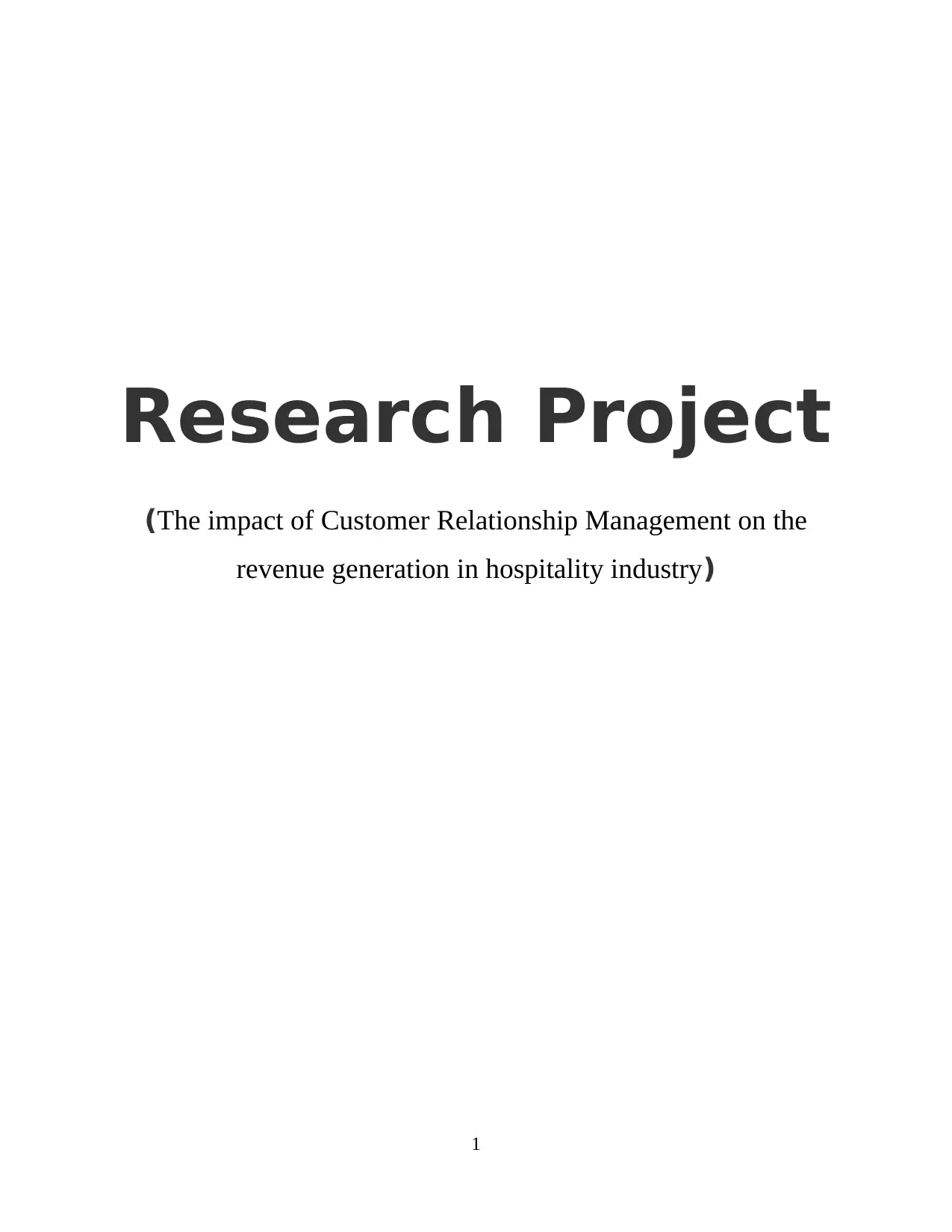
Research Project
(The impact of Customer Relationship Management on the
revenue generation in hospitality industry)
1
(The impact of Customer Relationship Management on the
revenue generation in hospitality industry)
1
Paraphrase This Document
Need a fresh take? Get an instant paraphrase of this document with our AI Paraphraser
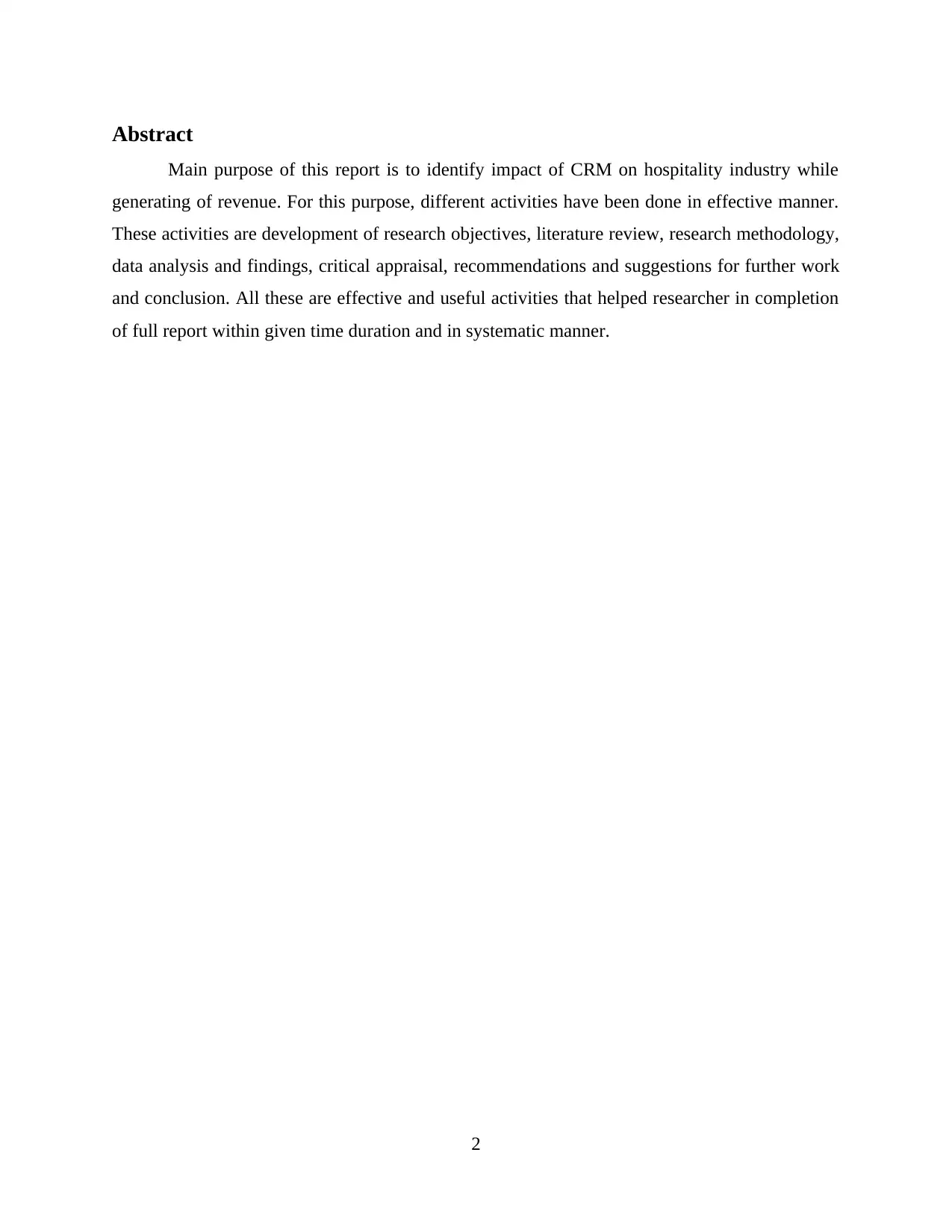
Abstract
Main purpose of this report is to identify impact of CRM on hospitality industry while
generating of revenue. For this purpose, different activities have been done in effective manner.
These activities are development of research objectives, literature review, research methodology,
data analysis and findings, critical appraisal, recommendations and suggestions for further work
and conclusion. All these are effective and useful activities that helped researcher in completion
of full report within given time duration and in systematic manner.
2
Main purpose of this report is to identify impact of CRM on hospitality industry while
generating of revenue. For this purpose, different activities have been done in effective manner.
These activities are development of research objectives, literature review, research methodology,
data analysis and findings, critical appraisal, recommendations and suggestions for further work
and conclusion. All these are effective and useful activities that helped researcher in completion
of full report within given time duration and in systematic manner.
2
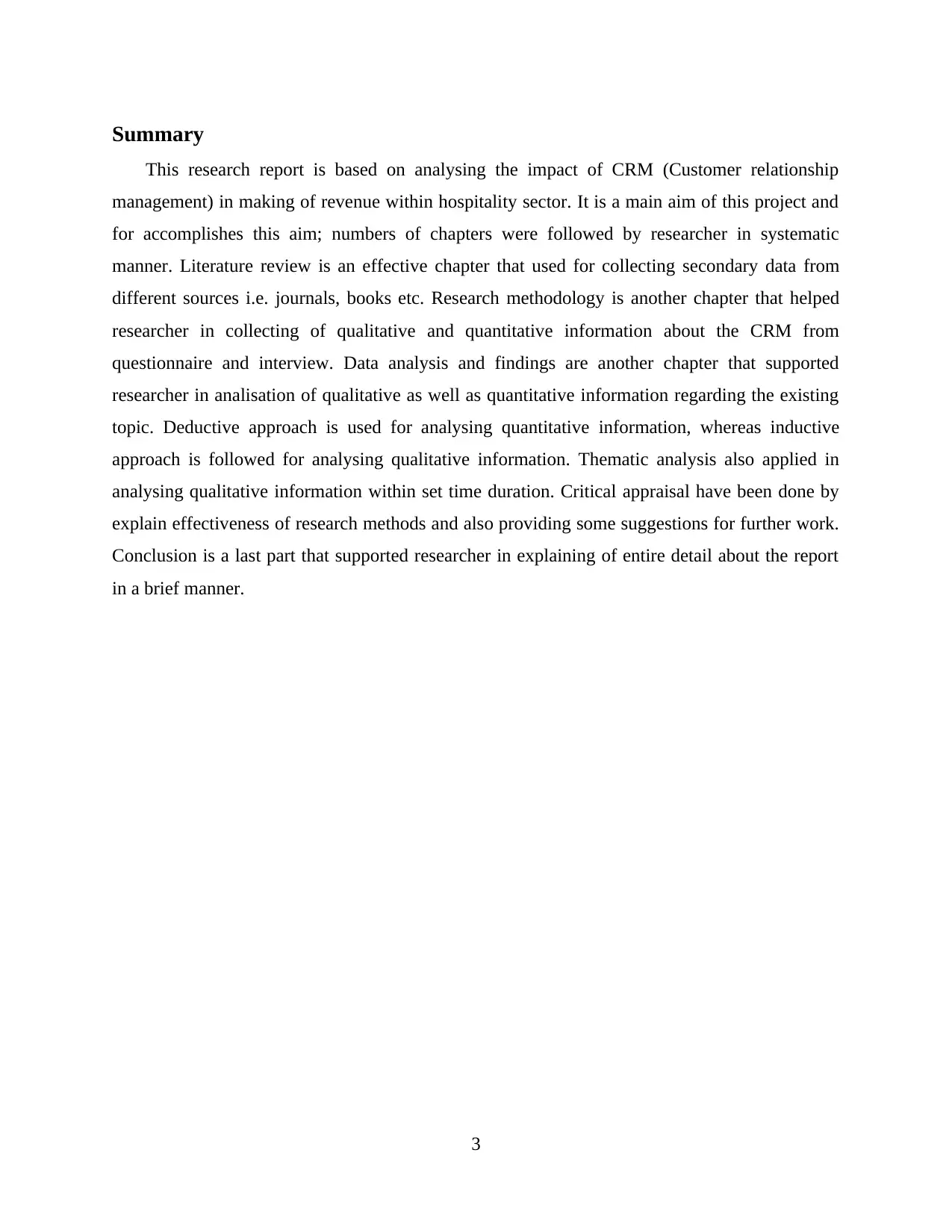
Summary
This research report is based on analysing the impact of CRM (Customer relationship
management) in making of revenue within hospitality sector. It is a main aim of this project and
for accomplishes this aim; numbers of chapters were followed by researcher in systematic
manner. Literature review is an effective chapter that used for collecting secondary data from
different sources i.e. journals, books etc. Research methodology is another chapter that helped
researcher in collecting of qualitative and quantitative information about the CRM from
questionnaire and interview. Data analysis and findings are another chapter that supported
researcher in analisation of qualitative as well as quantitative information regarding the existing
topic. Deductive approach is used for analysing quantitative information, whereas inductive
approach is followed for analysing qualitative information. Thematic analysis also applied in
analysing qualitative information within set time duration. Critical appraisal have been done by
explain effectiveness of research methods and also providing some suggestions for further work.
Conclusion is a last part that supported researcher in explaining of entire detail about the report
in a brief manner.
3
This research report is based on analysing the impact of CRM (Customer relationship
management) in making of revenue within hospitality sector. It is a main aim of this project and
for accomplishes this aim; numbers of chapters were followed by researcher in systematic
manner. Literature review is an effective chapter that used for collecting secondary data from
different sources i.e. journals, books etc. Research methodology is another chapter that helped
researcher in collecting of qualitative and quantitative information about the CRM from
questionnaire and interview. Data analysis and findings are another chapter that supported
researcher in analisation of qualitative as well as quantitative information regarding the existing
topic. Deductive approach is used for analysing quantitative information, whereas inductive
approach is followed for analysing qualitative information. Thematic analysis also applied in
analysing qualitative information within set time duration. Critical appraisal have been done by
explain effectiveness of research methods and also providing some suggestions for further work.
Conclusion is a last part that supported researcher in explaining of entire detail about the report
in a brief manner.
3
⊘ This is a preview!⊘
Do you want full access?
Subscribe today to unlock all pages.

Trusted by 1+ million students worldwide
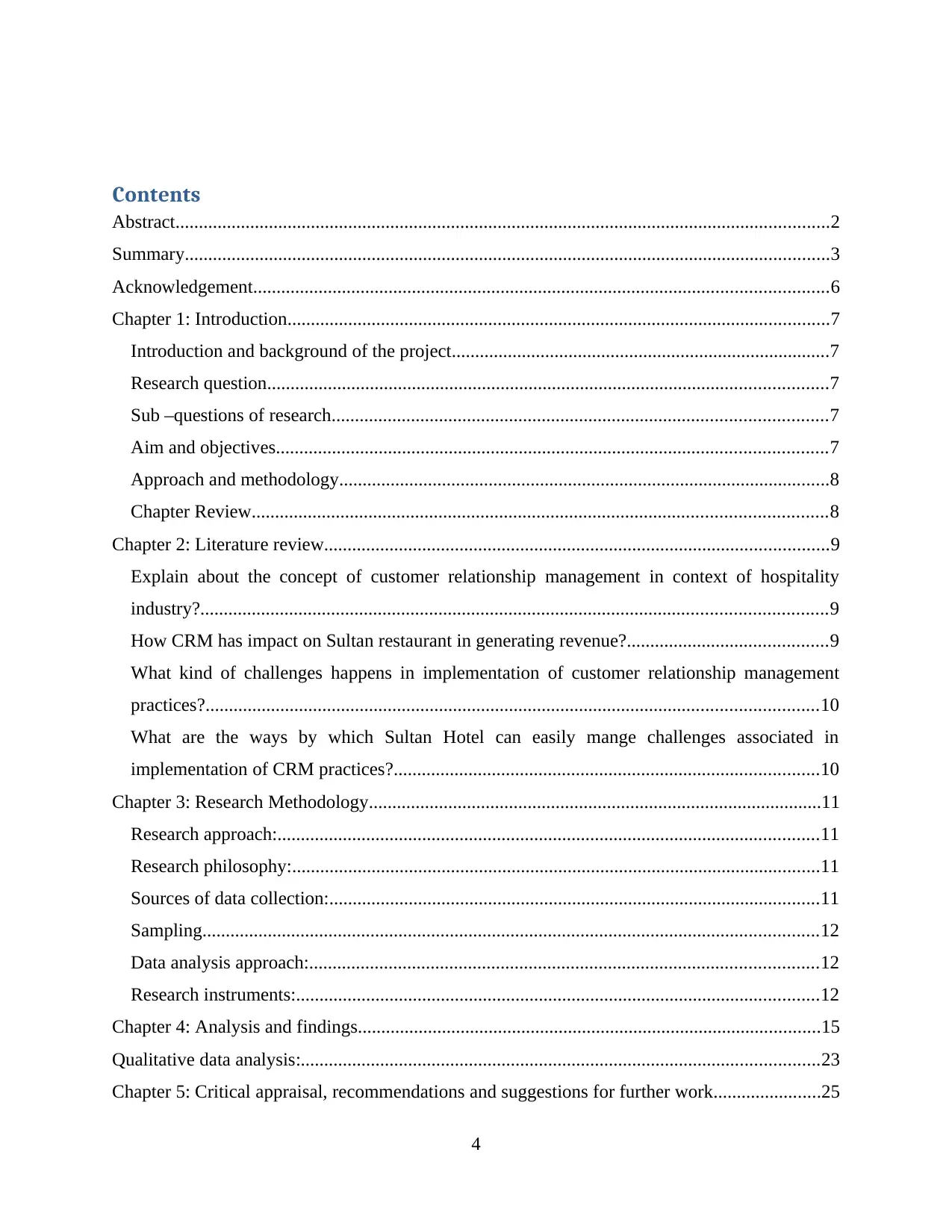
Contents
Abstract............................................................................................................................................2
Summary..........................................................................................................................................3
Acknowledgement...........................................................................................................................6
Chapter 1: Introduction....................................................................................................................7
Introduction and background of the project.................................................................................7
Research question........................................................................................................................7
Sub –questions of research..........................................................................................................7
Aim and objectives......................................................................................................................7
Approach and methodology.........................................................................................................8
Chapter Review...........................................................................................................................8
Chapter 2: Literature review............................................................................................................9
Explain about the concept of customer relationship management in context of hospitality
industry?......................................................................................................................................9
How CRM has impact on Sultan restaurant in generating revenue?...........................................9
What kind of challenges happens in implementation of customer relationship management
practices?...................................................................................................................................10
What are the ways by which Sultan Hotel can easily mange challenges associated in
implementation of CRM practices?...........................................................................................10
Chapter 3: Research Methodology.................................................................................................11
Research approach:....................................................................................................................11
Research philosophy:.................................................................................................................11
Sources of data collection:.........................................................................................................11
Sampling....................................................................................................................................12
Data analysis approach:.............................................................................................................12
Research instruments:................................................................................................................12
Chapter 4: Analysis and findings...................................................................................................15
Qualitative data analysis:...............................................................................................................23
Chapter 5: Critical appraisal, recommendations and suggestions for further work.......................25
4
Abstract............................................................................................................................................2
Summary..........................................................................................................................................3
Acknowledgement...........................................................................................................................6
Chapter 1: Introduction....................................................................................................................7
Introduction and background of the project.................................................................................7
Research question........................................................................................................................7
Sub –questions of research..........................................................................................................7
Aim and objectives......................................................................................................................7
Approach and methodology.........................................................................................................8
Chapter Review...........................................................................................................................8
Chapter 2: Literature review............................................................................................................9
Explain about the concept of customer relationship management in context of hospitality
industry?......................................................................................................................................9
How CRM has impact on Sultan restaurant in generating revenue?...........................................9
What kind of challenges happens in implementation of customer relationship management
practices?...................................................................................................................................10
What are the ways by which Sultan Hotel can easily mange challenges associated in
implementation of CRM practices?...........................................................................................10
Chapter 3: Research Methodology.................................................................................................11
Research approach:....................................................................................................................11
Research philosophy:.................................................................................................................11
Sources of data collection:.........................................................................................................11
Sampling....................................................................................................................................12
Data analysis approach:.............................................................................................................12
Research instruments:................................................................................................................12
Chapter 4: Analysis and findings...................................................................................................15
Qualitative data analysis:...............................................................................................................23
Chapter 5: Critical appraisal, recommendations and suggestions for further work.......................25
4
Paraphrase This Document
Need a fresh take? Get an instant paraphrase of this document with our AI Paraphraser
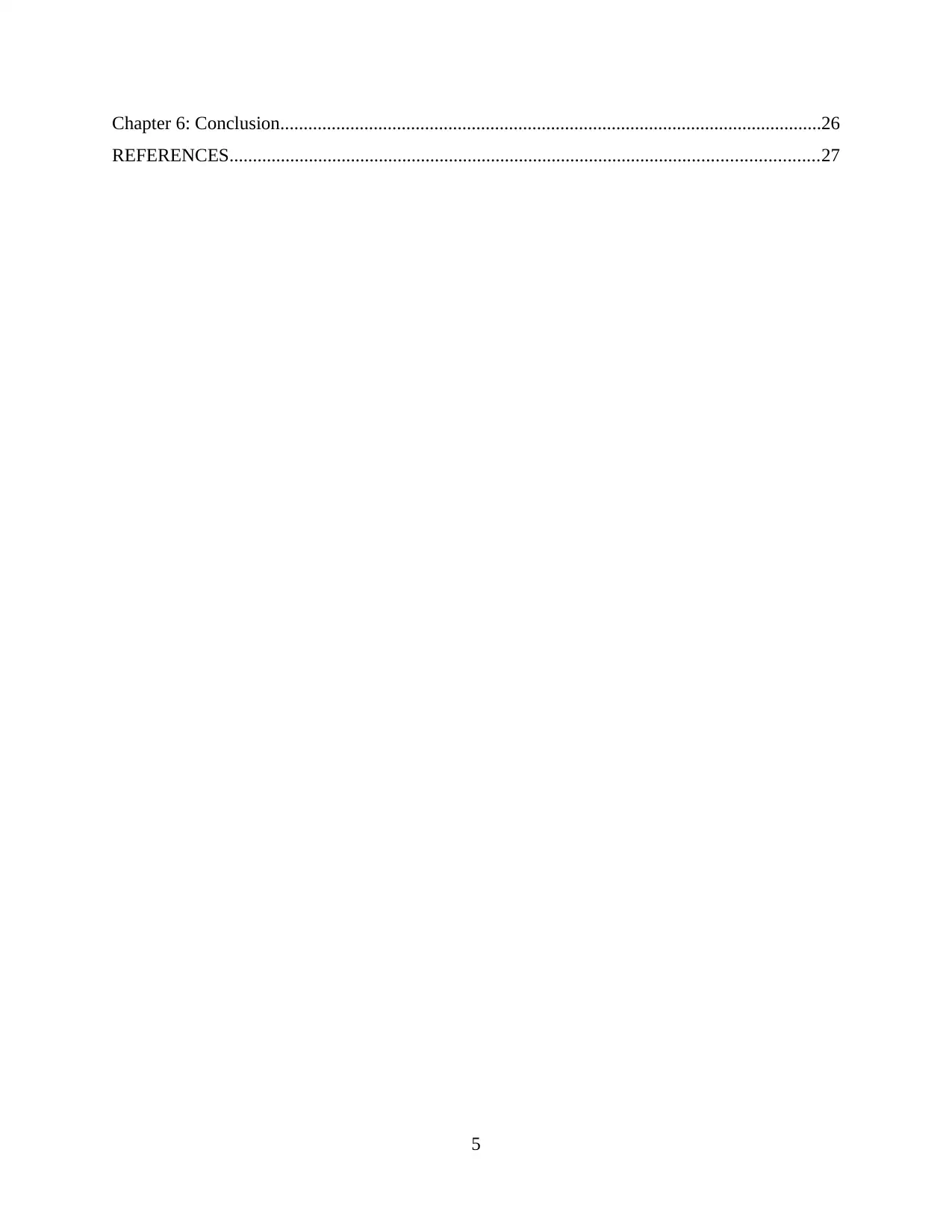
Chapter 6: Conclusion....................................................................................................................26
REFERENCES..............................................................................................................................27
5
REFERENCES..............................................................................................................................27
5
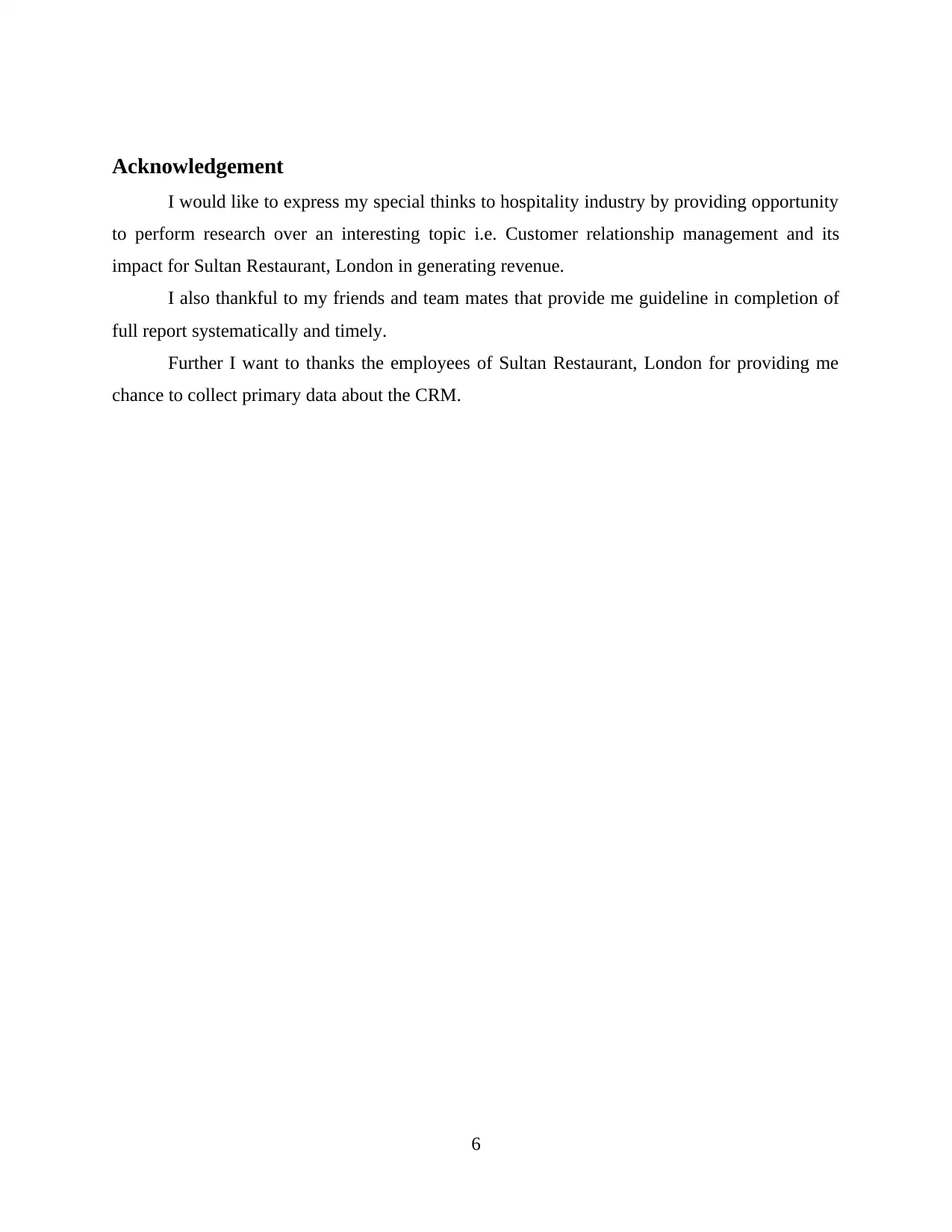
Acknowledgement
I would like to express my special thinks to hospitality industry by providing opportunity
to perform research over an interesting topic i.e. Customer relationship management and its
impact for Sultan Restaurant, London in generating revenue.
I also thankful to my friends and team mates that provide me guideline in completion of
full report systematically and timely.
Further I want to thanks the employees of Sultan Restaurant, London for providing me
chance to collect primary data about the CRM.
6
I would like to express my special thinks to hospitality industry by providing opportunity
to perform research over an interesting topic i.e. Customer relationship management and its
impact for Sultan Restaurant, London in generating revenue.
I also thankful to my friends and team mates that provide me guideline in completion of
full report systematically and timely.
Further I want to thanks the employees of Sultan Restaurant, London for providing me
chance to collect primary data about the CRM.
6
⊘ This is a preview!⊘
Do you want full access?
Subscribe today to unlock all pages.

Trusted by 1+ million students worldwide
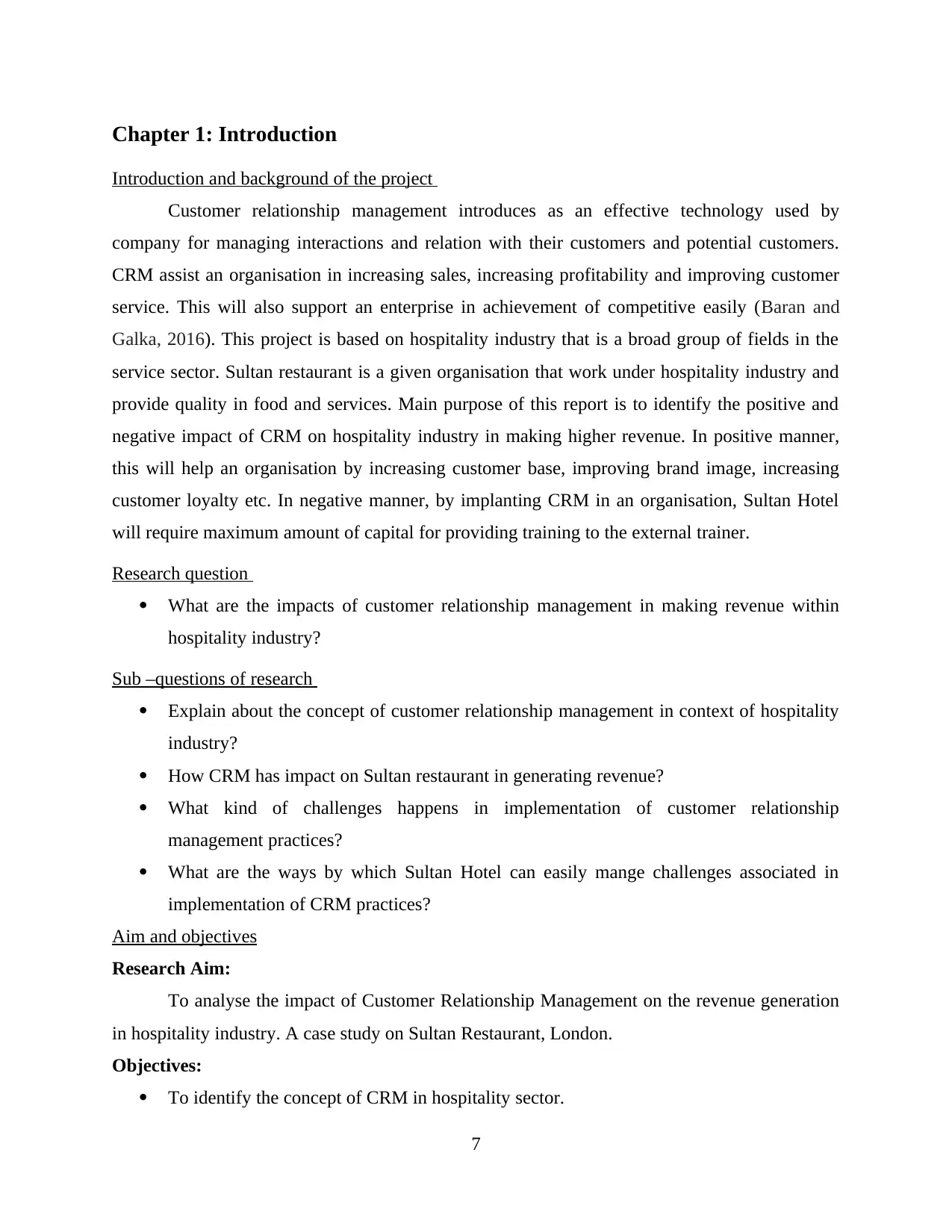
Chapter 1: Introduction
Introduction and background of the project
Customer relationship management introduces as an effective technology used by
company for managing interactions and relation with their customers and potential customers.
CRM assist an organisation in increasing sales, increasing profitability and improving customer
service. This will also support an enterprise in achievement of competitive easily (Baran and
Galka, 2016). This project is based on hospitality industry that is a broad group of fields in the
service sector. Sultan restaurant is a given organisation that work under hospitality industry and
provide quality in food and services. Main purpose of this report is to identify the positive and
negative impact of CRM on hospitality industry in making higher revenue. In positive manner,
this will help an organisation by increasing customer base, improving brand image, increasing
customer loyalty etc. In negative manner, by implanting CRM in an organisation, Sultan Hotel
will require maximum amount of capital for providing training to the external trainer.
Research question
What are the impacts of customer relationship management in making revenue within
hospitality industry?
Sub –questions of research
Explain about the concept of customer relationship management in context of hospitality
industry?
How CRM has impact on Sultan restaurant in generating revenue?
What kind of challenges happens in implementation of customer relationship
management practices?
What are the ways by which Sultan Hotel can easily mange challenges associated in
implementation of CRM practices?
Aim and objectives
Research Aim:
To analyse the impact of Customer Relationship Management on the revenue generation
in hospitality industry. A case study on Sultan Restaurant, London.
Objectives:
To identify the concept of CRM in hospitality sector.
7
Introduction and background of the project
Customer relationship management introduces as an effective technology used by
company for managing interactions and relation with their customers and potential customers.
CRM assist an organisation in increasing sales, increasing profitability and improving customer
service. This will also support an enterprise in achievement of competitive easily (Baran and
Galka, 2016). This project is based on hospitality industry that is a broad group of fields in the
service sector. Sultan restaurant is a given organisation that work under hospitality industry and
provide quality in food and services. Main purpose of this report is to identify the positive and
negative impact of CRM on hospitality industry in making higher revenue. In positive manner,
this will help an organisation by increasing customer base, improving brand image, increasing
customer loyalty etc. In negative manner, by implanting CRM in an organisation, Sultan Hotel
will require maximum amount of capital for providing training to the external trainer.
Research question
What are the impacts of customer relationship management in making revenue within
hospitality industry?
Sub –questions of research
Explain about the concept of customer relationship management in context of hospitality
industry?
How CRM has impact on Sultan restaurant in generating revenue?
What kind of challenges happens in implementation of customer relationship
management practices?
What are the ways by which Sultan Hotel can easily mange challenges associated in
implementation of CRM practices?
Aim and objectives
Research Aim:
To analyse the impact of Customer Relationship Management on the revenue generation
in hospitality industry. A case study on Sultan Restaurant, London.
Objectives:
To identify the concept of CRM in hospitality sector.
7
Paraphrase This Document
Need a fresh take? Get an instant paraphrase of this document with our AI Paraphraser
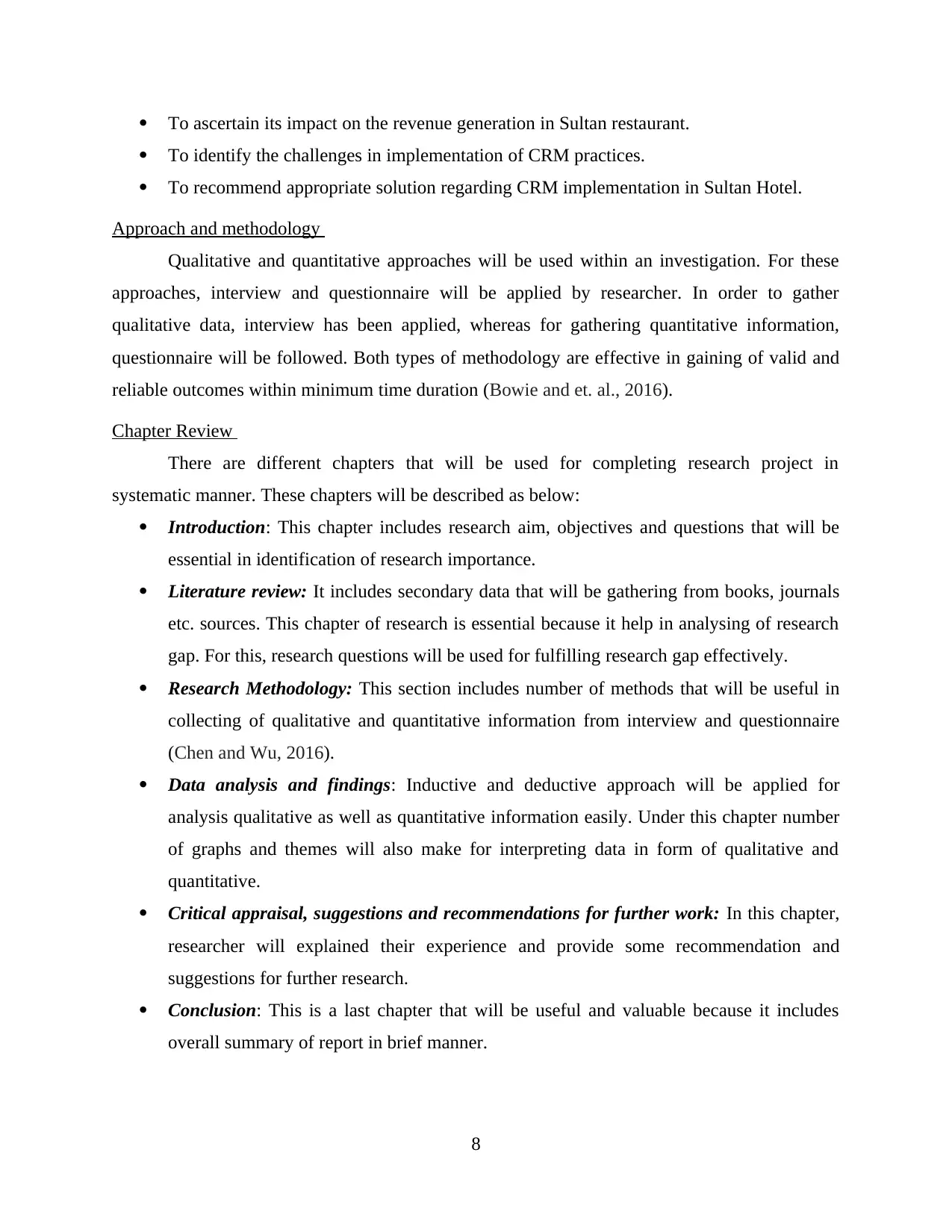
To ascertain its impact on the revenue generation in Sultan restaurant.
To identify the challenges in implementation of CRM practices.
To recommend appropriate solution regarding CRM implementation in Sultan Hotel.
Approach and methodology
Qualitative and quantitative approaches will be used within an investigation. For these
approaches, interview and questionnaire will be applied by researcher. In order to gather
qualitative data, interview has been applied, whereas for gathering quantitative information,
questionnaire will be followed. Both types of methodology are effective in gaining of valid and
reliable outcomes within minimum time duration (Bowie and et. al., 2016).
Chapter Review
There are different chapters that will be used for completing research project in
systematic manner. These chapters will be described as below:
Introduction: This chapter includes research aim, objectives and questions that will be
essential in identification of research importance.
Literature review: It includes secondary data that will be gathering from books, journals
etc. sources. This chapter of research is essential because it help in analysing of research
gap. For this, research questions will be used for fulfilling research gap effectively.
Research Methodology: This section includes number of methods that will be useful in
collecting of qualitative and quantitative information from interview and questionnaire
(Chen and Wu, 2016).
Data analysis and findings: Inductive and deductive approach will be applied for
analysis qualitative as well as quantitative information easily. Under this chapter number
of graphs and themes will also make for interpreting data in form of qualitative and
quantitative.
Critical appraisal, suggestions and recommendations for further work: In this chapter,
researcher will explained their experience and provide some recommendation and
suggestions for further research.
Conclusion: This is a last chapter that will be useful and valuable because it includes
overall summary of report in brief manner.
8
To identify the challenges in implementation of CRM practices.
To recommend appropriate solution regarding CRM implementation in Sultan Hotel.
Approach and methodology
Qualitative and quantitative approaches will be used within an investigation. For these
approaches, interview and questionnaire will be applied by researcher. In order to gather
qualitative data, interview has been applied, whereas for gathering quantitative information,
questionnaire will be followed. Both types of methodology are effective in gaining of valid and
reliable outcomes within minimum time duration (Bowie and et. al., 2016).
Chapter Review
There are different chapters that will be used for completing research project in
systematic manner. These chapters will be described as below:
Introduction: This chapter includes research aim, objectives and questions that will be
essential in identification of research importance.
Literature review: It includes secondary data that will be gathering from books, journals
etc. sources. This chapter of research is essential because it help in analysing of research
gap. For this, research questions will be used for fulfilling research gap effectively.
Research Methodology: This section includes number of methods that will be useful in
collecting of qualitative and quantitative information from interview and questionnaire
(Chen and Wu, 2016).
Data analysis and findings: Inductive and deductive approach will be applied for
analysis qualitative as well as quantitative information easily. Under this chapter number
of graphs and themes will also make for interpreting data in form of qualitative and
quantitative.
Critical appraisal, suggestions and recommendations for further work: In this chapter,
researcher will explained their experience and provide some recommendation and
suggestions for further research.
Conclusion: This is a last chapter that will be useful and valuable because it includes
overall summary of report in brief manner.
8
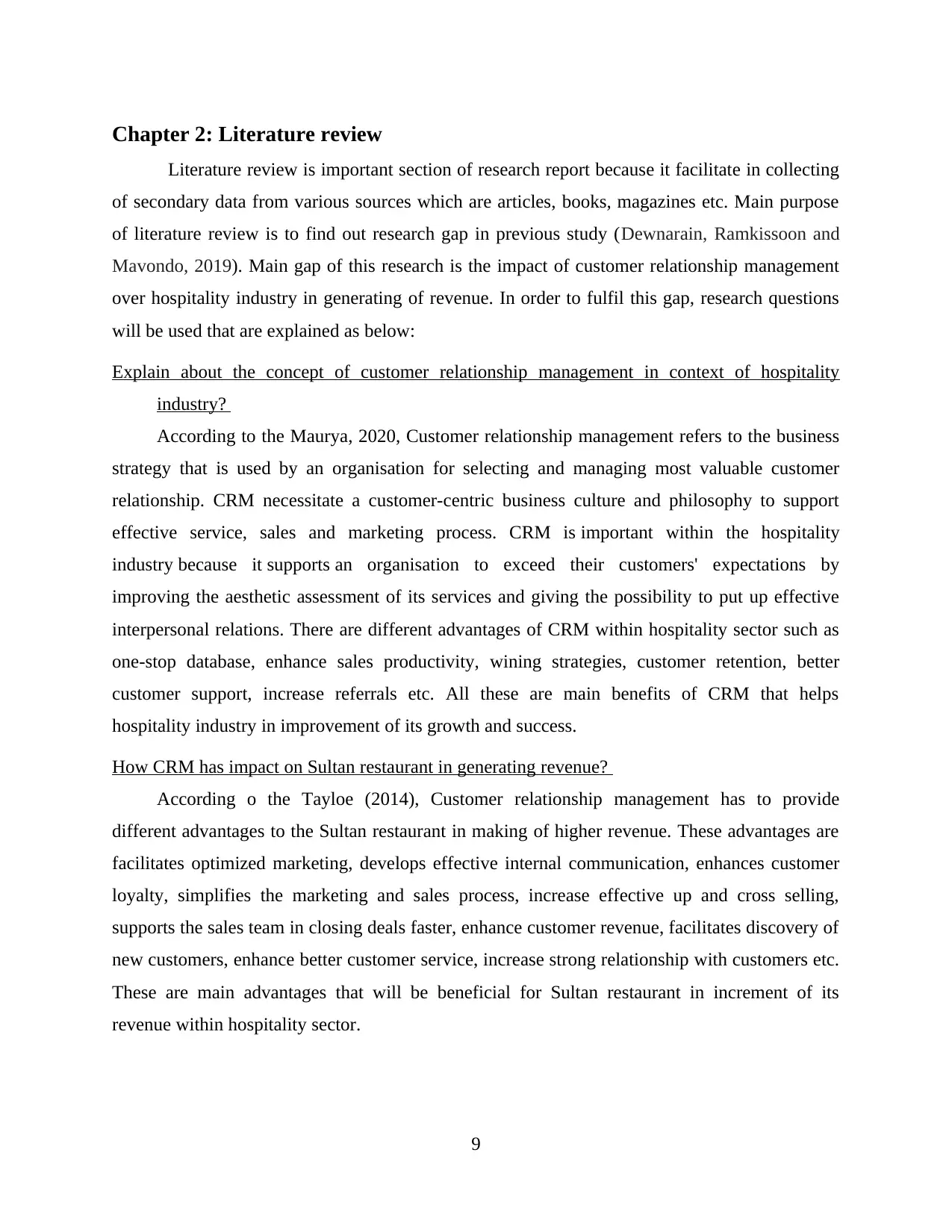
Chapter 2: Literature review
Literature review is important section of research report because it facilitate in collecting
of secondary data from various sources which are articles, books, magazines etc. Main purpose
of literature review is to find out research gap in previous study (Dewnarain, Ramkissoon and
Mavondo, 2019). Main gap of this research is the impact of customer relationship management
over hospitality industry in generating of revenue. In order to fulfil this gap, research questions
will be used that are explained as below:
Explain about the concept of customer relationship management in context of hospitality
industry?
According to the Maurya, 2020, Customer relationship management refers to the business
strategy that is used by an organisation for selecting and managing most valuable customer
relationship. CRM necessitate a customer-centric business culture and philosophy to support
effective service, sales and marketing process. CRM is important within the hospitality
industry because it supports an organisation to exceed their customers' expectations by
improving the aesthetic assessment of its services and giving the possibility to put up effective
interpersonal relations. There are different advantages of CRM within hospitality sector such as
one-stop database, enhance sales productivity, wining strategies, customer retention, better
customer support, increase referrals etc. All these are main benefits of CRM that helps
hospitality industry in improvement of its growth and success.
How CRM has impact on Sultan restaurant in generating revenue?
According o the Tayloe (2014), Customer relationship management has to provide
different advantages to the Sultan restaurant in making of higher revenue. These advantages are
facilitates optimized marketing, develops effective internal communication, enhances customer
loyalty, simplifies the marketing and sales process, increase effective up and cross selling,
supports the sales team in closing deals faster, enhance customer revenue, facilitates discovery of
new customers, enhance better customer service, increase strong relationship with customers etc.
These are main advantages that will be beneficial for Sultan restaurant in increment of its
revenue within hospitality sector.
9
Literature review is important section of research report because it facilitate in collecting
of secondary data from various sources which are articles, books, magazines etc. Main purpose
of literature review is to find out research gap in previous study (Dewnarain, Ramkissoon and
Mavondo, 2019). Main gap of this research is the impact of customer relationship management
over hospitality industry in generating of revenue. In order to fulfil this gap, research questions
will be used that are explained as below:
Explain about the concept of customer relationship management in context of hospitality
industry?
According to the Maurya, 2020, Customer relationship management refers to the business
strategy that is used by an organisation for selecting and managing most valuable customer
relationship. CRM necessitate a customer-centric business culture and philosophy to support
effective service, sales and marketing process. CRM is important within the hospitality
industry because it supports an organisation to exceed their customers' expectations by
improving the aesthetic assessment of its services and giving the possibility to put up effective
interpersonal relations. There are different advantages of CRM within hospitality sector such as
one-stop database, enhance sales productivity, wining strategies, customer retention, better
customer support, increase referrals etc. All these are main benefits of CRM that helps
hospitality industry in improvement of its growth and success.
How CRM has impact on Sultan restaurant in generating revenue?
According o the Tayloe (2014), Customer relationship management has to provide
different advantages to the Sultan restaurant in making of higher revenue. These advantages are
facilitates optimized marketing, develops effective internal communication, enhances customer
loyalty, simplifies the marketing and sales process, increase effective up and cross selling,
supports the sales team in closing deals faster, enhance customer revenue, facilitates discovery of
new customers, enhance better customer service, increase strong relationship with customers etc.
These are main advantages that will be beneficial for Sultan restaurant in increment of its
revenue within hospitality sector.
9
⊘ This is a preview!⊘
Do you want full access?
Subscribe today to unlock all pages.

Trusted by 1+ million students worldwide
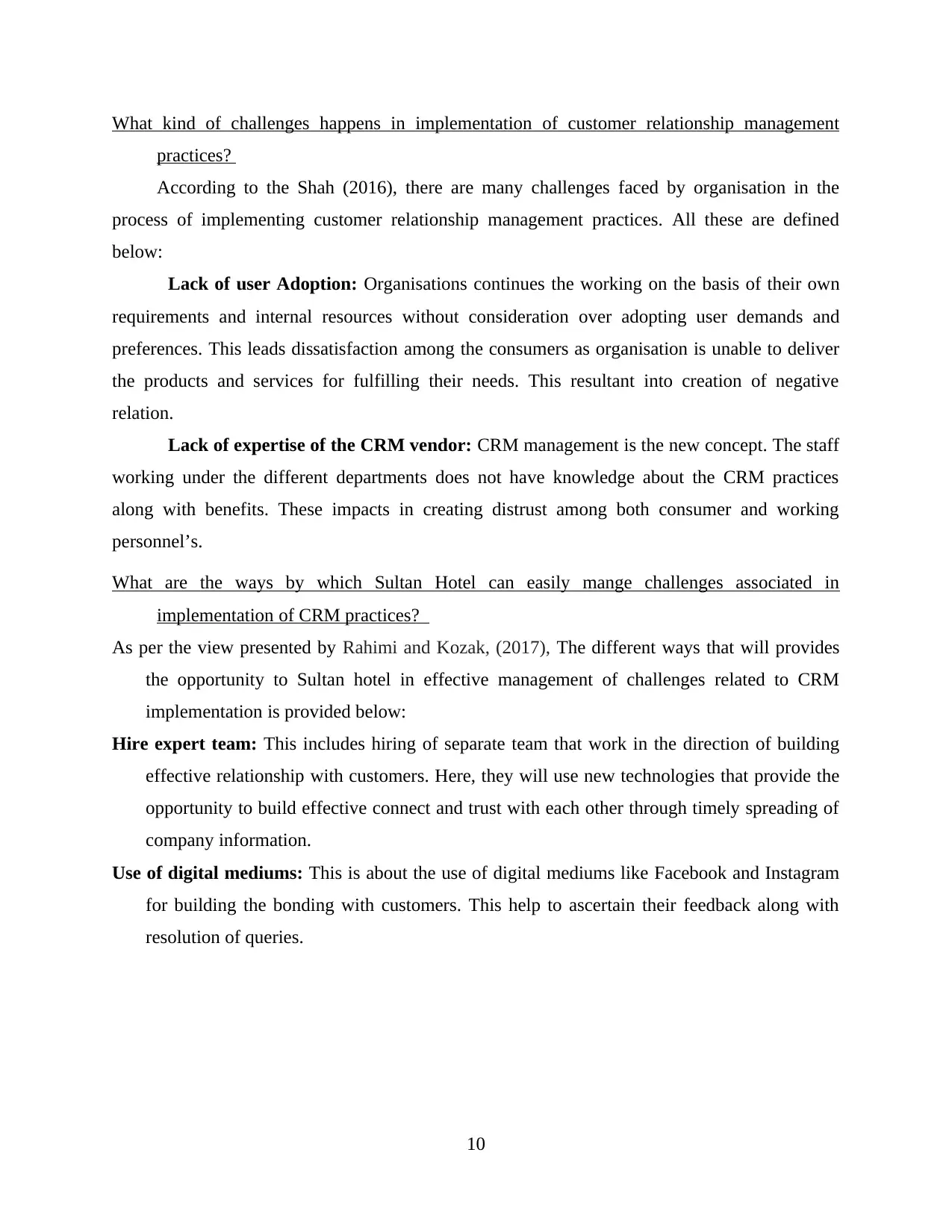
What kind of challenges happens in implementation of customer relationship management
practices?
According to the Shah (2016), there are many challenges faced by organisation in the
process of implementing customer relationship management practices. All these are defined
below:
Lack of user Adoption: Organisations continues the working on the basis of their own
requirements and internal resources without consideration over adopting user demands and
preferences. This leads dissatisfaction among the consumers as organisation is unable to deliver
the products and services for fulfilling their needs. This resultant into creation of negative
relation.
Lack of expertise of the CRM vendor: CRM management is the new concept. The staff
working under the different departments does not have knowledge about the CRM practices
along with benefits. These impacts in creating distrust among both consumer and working
personnel’s.
What are the ways by which Sultan Hotel can easily mange challenges associated in
implementation of CRM practices?
As per the view presented by Rahimi and Kozak, (2017), The different ways that will provides
the opportunity to Sultan hotel in effective management of challenges related to CRM
implementation is provided below:
Hire expert team: This includes hiring of separate team that work in the direction of building
effective relationship with customers. Here, they will use new technologies that provide the
opportunity to build effective connect and trust with each other through timely spreading of
company information.
Use of digital mediums: This is about the use of digital mediums like Facebook and Instagram
for building the bonding with customers. This help to ascertain their feedback along with
resolution of queries.
10
practices?
According to the Shah (2016), there are many challenges faced by organisation in the
process of implementing customer relationship management practices. All these are defined
below:
Lack of user Adoption: Organisations continues the working on the basis of their own
requirements and internal resources without consideration over adopting user demands and
preferences. This leads dissatisfaction among the consumers as organisation is unable to deliver
the products and services for fulfilling their needs. This resultant into creation of negative
relation.
Lack of expertise of the CRM vendor: CRM management is the new concept. The staff
working under the different departments does not have knowledge about the CRM practices
along with benefits. These impacts in creating distrust among both consumer and working
personnel’s.
What are the ways by which Sultan Hotel can easily mange challenges associated in
implementation of CRM practices?
As per the view presented by Rahimi and Kozak, (2017), The different ways that will provides
the opportunity to Sultan hotel in effective management of challenges related to CRM
implementation is provided below:
Hire expert team: This includes hiring of separate team that work in the direction of building
effective relationship with customers. Here, they will use new technologies that provide the
opportunity to build effective connect and trust with each other through timely spreading of
company information.
Use of digital mediums: This is about the use of digital mediums like Facebook and Instagram
for building the bonding with customers. This help to ascertain their feedback along with
resolution of queries.
10
Paraphrase This Document
Need a fresh take? Get an instant paraphrase of this document with our AI Paraphraser
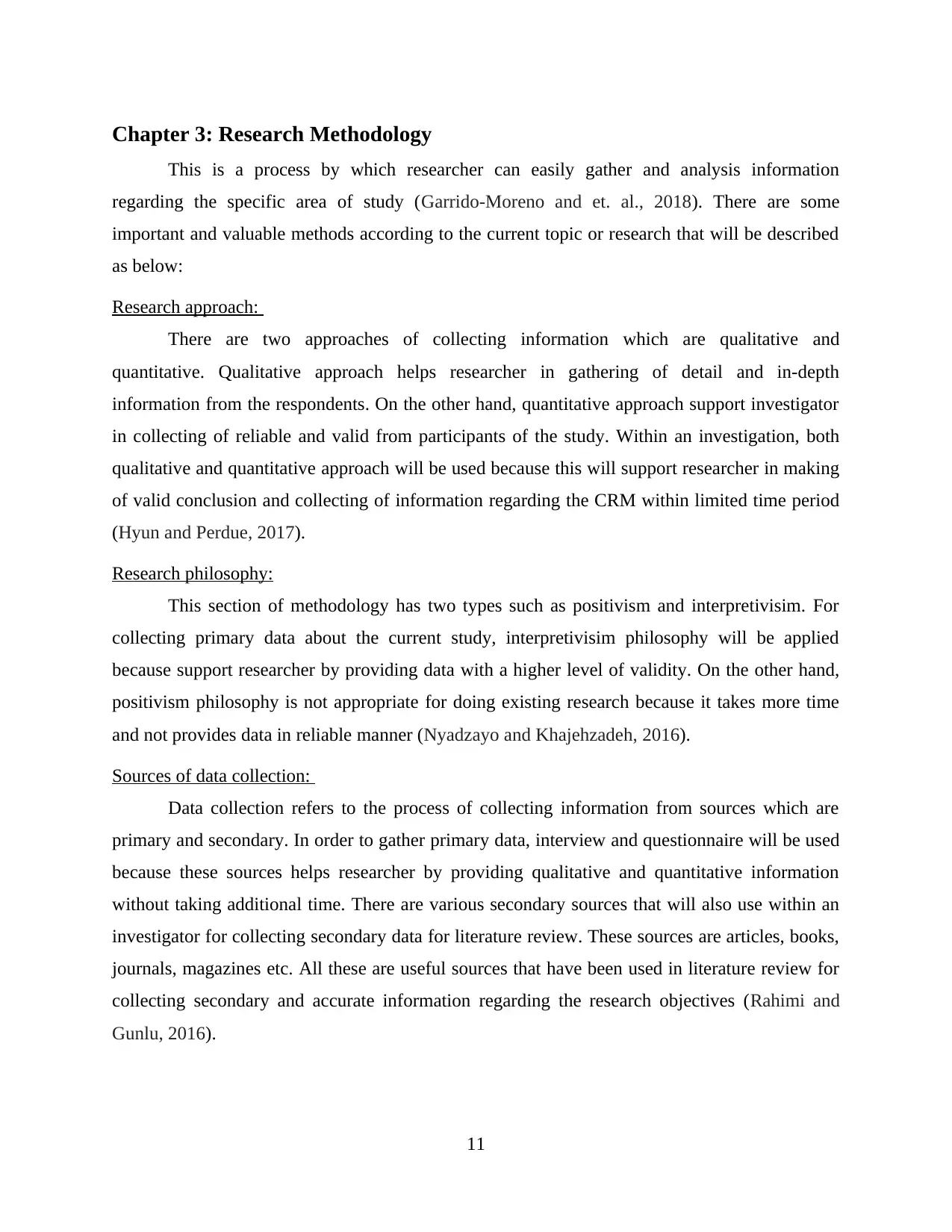
Chapter 3: Research Methodology
This is a process by which researcher can easily gather and analysis information
regarding the specific area of study (Garrido-Moreno and et. al., 2018). There are some
important and valuable methods according to the current topic or research that will be described
as below:
Research approach:
There are two approaches of collecting information which are qualitative and
quantitative. Qualitative approach helps researcher in gathering of detail and in-depth
information from the respondents. On the other hand, quantitative approach support investigator
in collecting of reliable and valid from participants of the study. Within an investigation, both
qualitative and quantitative approach will be used because this will support researcher in making
of valid conclusion and collecting of information regarding the CRM within limited time period
(Hyun and Perdue, 2017).
Research philosophy:
This section of methodology has two types such as positivism and interpretivisim. For
collecting primary data about the current study, interpretivisim philosophy will be applied
because support researcher by providing data with a higher level of validity. On the other hand,
positivism philosophy is not appropriate for doing existing research because it takes more time
and not provides data in reliable manner (Nyadzayo and Khajehzadeh, 2016).
Sources of data collection:
Data collection refers to the process of collecting information from sources which are
primary and secondary. In order to gather primary data, interview and questionnaire will be used
because these sources helps researcher by providing qualitative and quantitative information
without taking additional time. There are various secondary sources that will also use within an
investigator for collecting secondary data for literature review. These sources are articles, books,
journals, magazines etc. All these are useful sources that have been used in literature review for
collecting secondary and accurate information regarding the research objectives (Rahimi and
Gunlu, 2016).
11
This is a process by which researcher can easily gather and analysis information
regarding the specific area of study (Garrido-Moreno and et. al., 2018). There are some
important and valuable methods according to the current topic or research that will be described
as below:
Research approach:
There are two approaches of collecting information which are qualitative and
quantitative. Qualitative approach helps researcher in gathering of detail and in-depth
information from the respondents. On the other hand, quantitative approach support investigator
in collecting of reliable and valid from participants of the study. Within an investigation, both
qualitative and quantitative approach will be used because this will support researcher in making
of valid conclusion and collecting of information regarding the CRM within limited time period
(Hyun and Perdue, 2017).
Research philosophy:
This section of methodology has two types such as positivism and interpretivisim. For
collecting primary data about the current study, interpretivisim philosophy will be applied
because support researcher by providing data with a higher level of validity. On the other hand,
positivism philosophy is not appropriate for doing existing research because it takes more time
and not provides data in reliable manner (Nyadzayo and Khajehzadeh, 2016).
Sources of data collection:
Data collection refers to the process of collecting information from sources which are
primary and secondary. In order to gather primary data, interview and questionnaire will be used
because these sources helps researcher by providing qualitative and quantitative information
without taking additional time. There are various secondary sources that will also use within an
investigator for collecting secondary data for literature review. These sources are articles, books,
journals, magazines etc. All these are useful sources that have been used in literature review for
collecting secondary and accurate information regarding the research objectives (Rahimi and
Gunlu, 2016).
11
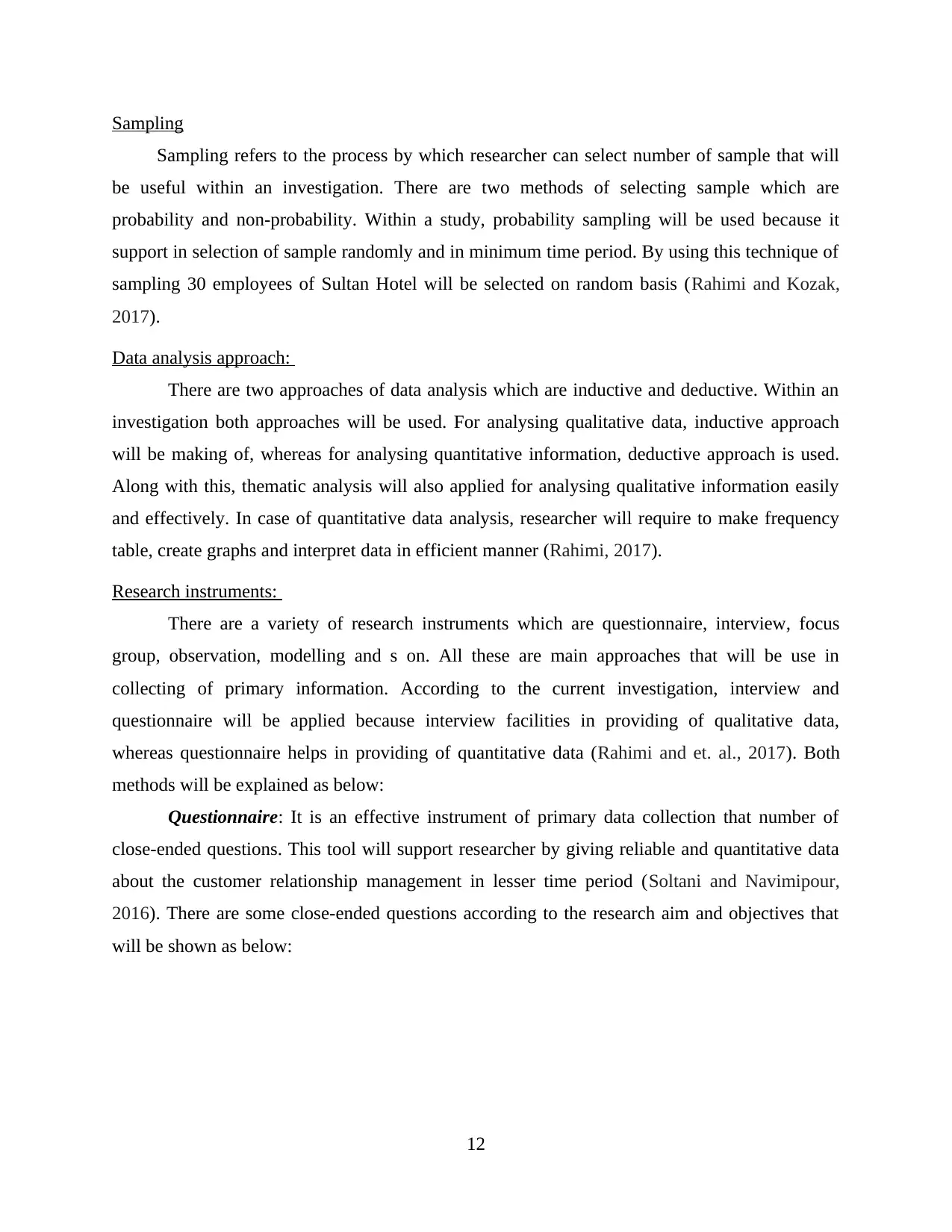
Sampling
Sampling refers to the process by which researcher can select number of sample that will
be useful within an investigation. There are two methods of selecting sample which are
probability and non-probability. Within a study, probability sampling will be used because it
support in selection of sample randomly and in minimum time period. By using this technique of
sampling 30 employees of Sultan Hotel will be selected on random basis (Rahimi and Kozak,
2017).
Data analysis approach:
There are two approaches of data analysis which are inductive and deductive. Within an
investigation both approaches will be used. For analysing qualitative data, inductive approach
will be making of, whereas for analysing quantitative information, deductive approach is used.
Along with this, thematic analysis will also applied for analysing qualitative information easily
and effectively. In case of quantitative data analysis, researcher will require to make frequency
table, create graphs and interpret data in efficient manner (Rahimi, 2017).
Research instruments:
There are a variety of research instruments which are questionnaire, interview, focus
group, observation, modelling and s on. All these are main approaches that will be use in
collecting of primary information. According to the current investigation, interview and
questionnaire will be applied because interview facilities in providing of qualitative data,
whereas questionnaire helps in providing of quantitative data (Rahimi and et. al., 2017). Both
methods will be explained as below:
Questionnaire: It is an effective instrument of primary data collection that number of
close-ended questions. This tool will support researcher by giving reliable and quantitative data
about the customer relationship management in lesser time period (Soltani and Navimipour,
2016). There are some close-ended questions according to the research aim and objectives that
will be shown as below:
12
Sampling refers to the process by which researcher can select number of sample that will
be useful within an investigation. There are two methods of selecting sample which are
probability and non-probability. Within a study, probability sampling will be used because it
support in selection of sample randomly and in minimum time period. By using this technique of
sampling 30 employees of Sultan Hotel will be selected on random basis (Rahimi and Kozak,
2017).
Data analysis approach:
There are two approaches of data analysis which are inductive and deductive. Within an
investigation both approaches will be used. For analysing qualitative data, inductive approach
will be making of, whereas for analysing quantitative information, deductive approach is used.
Along with this, thematic analysis will also applied for analysing qualitative information easily
and effectively. In case of quantitative data analysis, researcher will require to make frequency
table, create graphs and interpret data in efficient manner (Rahimi, 2017).
Research instruments:
There are a variety of research instruments which are questionnaire, interview, focus
group, observation, modelling and s on. All these are main approaches that will be use in
collecting of primary information. According to the current investigation, interview and
questionnaire will be applied because interview facilities in providing of qualitative data,
whereas questionnaire helps in providing of quantitative data (Rahimi and et. al., 2017). Both
methods will be explained as below:
Questionnaire: It is an effective instrument of primary data collection that number of
close-ended questions. This tool will support researcher by giving reliable and quantitative data
about the customer relationship management in lesser time period (Soltani and Navimipour,
2016). There are some close-ended questions according to the research aim and objectives that
will be shown as below:
12
⊘ This is a preview!⊘
Do you want full access?
Subscribe today to unlock all pages.

Trusted by 1+ million students worldwide
1 out of 28
Related Documents
Your All-in-One AI-Powered Toolkit for Academic Success.
+13062052269
info@desklib.com
Available 24*7 on WhatsApp / Email
![[object Object]](/_next/static/media/star-bottom.7253800d.svg)
Unlock your academic potential
Copyright © 2020–2026 A2Z Services. All Rights Reserved. Developed and managed by ZUCOL.



